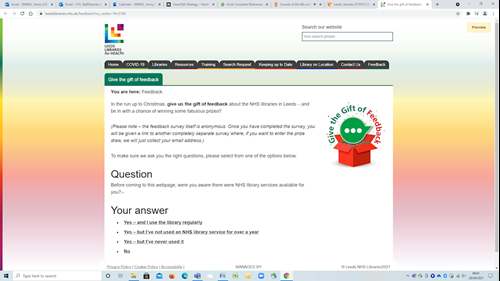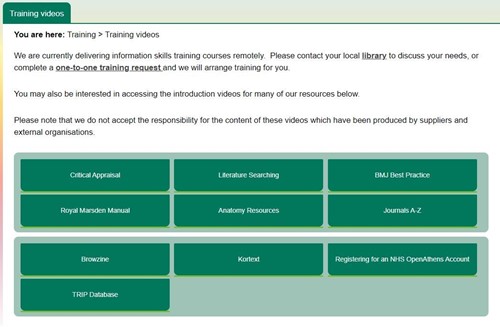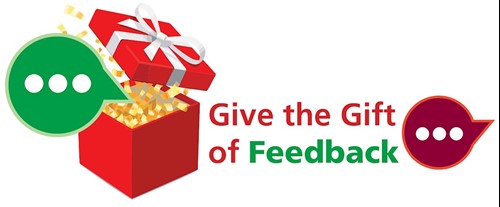What did we do?
The Leeds Libraries for Health partnership runs a Christmas campaign every year. For 2019, it was decided to combine this with a user survey (the previous one had been done in 2012) – and the idea of ‘Give the Gift of Feedback’ was born.
The survey (using SmartSurvey) was promoted via our patch website throughout December, and was advertised to Trusts using internal briefings and social media. An anonymous Prize Draw was offered to encourage participation, with three prizes of Love2shop vouchers.
How many people responded?
Initial analysis of the results started in early 2020 – and we were delighted to receive 731 survey responses. Detailed analysis was delayed due to the pandemic and only completed in November 2020. The results were shared within the Leeds Libraries Project Team, and detailed Trust specific responses were passed to service managers for local action.

The first screening question sent respondents down a differing route of questions, depending on whether they said that they:
- knew about the library and regularly used it (n=359)
- knew about the library but had not used it for over a year (n=204)
- knew about the library but hadn’t used it (n=129)
- didn’t know about the library service (n=39)
What did the responses tell us?
Respondents highlighted the continuing prominence of Google when looking for information. This has led to discussions locally about what we can do to make our presence felt more widely on Google. Leeds Community Healthcare have a subscription to LibKey (including BrowZine), and have started widely promoting the LibKey Nomad feature, which gives staff one-click access to articles found via Google (including links to article request forms). The short training sessions for this have been incredibly popular, and journal usage has significantly increased as a result.
We have previously run a course entitled ‘Google and beyond’, and it might be useful to refine this to a quick session about providing tips for searching Google, and/or as a quick guide. We know that library users will use Google – how can we best help them to do this?
Respondents highlighted how the library services save time (echoing the findings of HEE’s Value Proposition). Making it clear to users that they do not need to physically visit the library is key, although the pandemic and the use of MS Teams has probably helped lead them to be more confident in contacting the library virtually.
Analysis of the survey showed how important it is to promote the fact that the library service is not just for staff undertaking courses, and also that even previous users forget what the library can offer. Non-users may not see that the library is relevant to them (e.g. non-clinical colleagues) or may not know where to start. These are all issues to be borne in mind and to inform our marketing.
There was confusion about NHS OpenAthens from some users, and we have provided additional information about it on the homepage of our website.
Some respondents mentioned the role libraries play in health and wellbeing; this has been an increasing area of work over several years, and has been regularly marketed through our “Get Lost in a Book” campaign and the “Health and Wellbeing resources” page on our website. Through the pandemic, this health and wellbeing work has been an important area of support for users.
Clearly the pandemic stopped the library services getting ‘out and about’ (which was one of the requests from respondents), but we have fully embraced the use of MS Teams (including sharing learning within Leeds and beyond) and currently offer all our courses online. We have recently created a page of training videos for our users to access at their convenience. We also recognise the importance of quick bite-sized sessions and anticipate that these will be required as we promote the new national Discovery tool, as well as the HDAS changes in 2022.

Some respondents queried, or suggested, services that the library teams already provide. We have to recognise that we can’t please everyone all of the time, and that it is very important to use an ongoing programme of marketing, reaching out to different users in varied ways and using different channels (e.g. via Trust health and wellbeing teams). It has also given us the prompt to revisit how library services are promoted at corporate induction events. The timing and focus of any messages sent out, and their direct relevance and appropriateness to the recipients is key.
Would our users recommend the service?
Rather pleasingly, when asked whether they would recommend our services, over 98% of the users that responded said yes! And for the non-library users who responded to the survey, the act of receiving it (which included details of the services on offer) had prompted some of them to register and use the library.

Jenny Emmel, Corporate Support Librarian, Leeds Teaching Hospitals NHS Trust
Helen Swales, Library Service Manager, Leeds Community Healthcare NHS Trust
Paul Twiddy, Library and Information Service Manager, Leeds Teaching Hospitals NHS Trust

